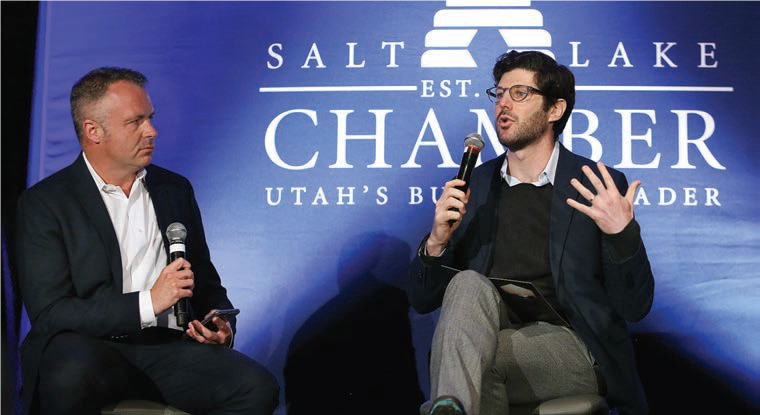By Brice Wallace
When it comes to immigration, Utah is different.
That was the sentiment expressed by several speakers at the recent American Dream Awards ceremony in Salt Lake City. That difference, they said, stems from the state’s heritage.
“These awards are a nod to Salt Lake City’s pioneer founders and their decision to settle in Utah as religious refugees,” said Tim Wheelwright, chairman of the Salt Lake Chamber’s Immigration Reform Task Force. “Since that time, Utah has welcomed hundreds of thousands of refugees and immigrants from all religious backgrounds, social stations and regions.{mprestriction ids="1,3"}
“When we hosted the Olympics in 2002, we said, ‘The world is welcome here.’ That is not an empty catchphrase. That is, in fact, who we are.”
Three immigrants and one organization received the awards during the chamber event: Aden Batar, director of immigration and refugee resettlement at Catholic Community Services; Luz Escamilla, a Utah state senator and vice president of community development at Zions Bank; Valter Nassi, owner and proprietor of Valter’s Osteria; and LDS Humanitarian Services, part of the Church of Jesus Christ of Latter-day Saints.
Lane Beattie, the chamber’s president and chief executive officer, said the awards “showcase the amazing immigrants that are making a difference in our community.”
The LDS church in 2016 responded to 147 countries on 2,630 projects with over 1,500 partners to serve millions of people worldwide. Steve Peterson, managing director of the church’s welfare system, urged audience members to assist people new to Utah.
“This community was settled by pioneers about 171 years ago, and they themselves were refugees and immigrants and homeless and downtrodden,” Peterson said. “And I think that it’s only fitting and appropriate that today we have the opportunity, as well as the responsibility, to try to reach out and help those that are suffering from similar circumstances today in this community.”
Salt Lake City and Utah “welcomed me and gave me a home,” said Batar, who came to Utah after fleeing Somalia. “When we came here, it was not easy, but we were welcomed with open arms. … And that’s why I like Utah, because it is the most welcoming state in the United States. You made that, and let’s continue that, and let’s welcome more refugees into our community.”
Escamilla, who in 2008 became the first immigrant elected to the state Legislature, said that in a nation “extremely divided by political rhetoric, hatred and bigotry,” the awards symbolize hope.
“By inviting and encouraging and recognizing and embracing the stories and experiences of new pioneers, new Americans, immigrants and refugees and those who serve them, we are welcoming the dialogue that is so needed in these times,” said Escamilla, born in Mexico. “It allows for us to be humans. We should humanize new Americans, and it serves as a reminder that this country was and continues to be built on the backs of new Americans and their families.”
Jeremy Robbins, executive director of the New American Economy, a bipartisan coalition of more than 500 CEOs and mayors making the economic case for immigration reform, said Utah has 250,000 immigrants. About 12,000 have started businesses that employ 31,000 people. Immigrants, he said, “are all over the economy.”
While the national debate about immigration is “very fractured,” he said, “immigration is a great thing for America’s economy.” One of the nation’s competitive advantages is having new generations of people “come and reinvigorate the American spirit,” he said.
Still, immigration has been used as a political football “where you don’t ever really solve the problem,” and it is easy for immigration reform supporters to become disheartened, he said. Every few years, Congress seems to make progress on reform, only to see it falter.
But Robbins encouraged everyone to get involved.
“Most of us don’t have a natural platform for this. It’s easy to feel like, ‘I don’t matter. I can’t do this. I don’t really know the issue well enough so I’m not going to call Congress. It’s so disheartening. What if this guy asks some questions I can’t answer? I’m not a political activist.’
“The reality is, it’s easier than you think. It feels really hard and it feels like one voice among 330 million doesn’t matter,” but members of Congress track phone calls they receive and pay attention to stories, columns and letters to the editor in newspapers as they “test the waters” on issues, Robbins said.
“I think most members are looking for a way to get to ‘yes’ on immigration and they need to feel like they’re supported,” he said.
Jason Mathis, executive vice president of the Salt Lake Chamber, expressed optimism that audience members would leave with “a small sense of hope on this issue.”
“It is an issue that is divisive. It is an issue that’s easy to be disheartened on. It’s an issue that it’s easy to get beaten down on because every day there’s another story or something else that’s going on and not always positive – most of the time negative,” he said, urging people to “recommit to the issue.”
“Because, really,” he said, “it’s only through the efforts of everyone who is here today and thousands of other regular, ordinary, normal businesspeople and other people, that we’ll ever get anything done.”{/mprestriction}








